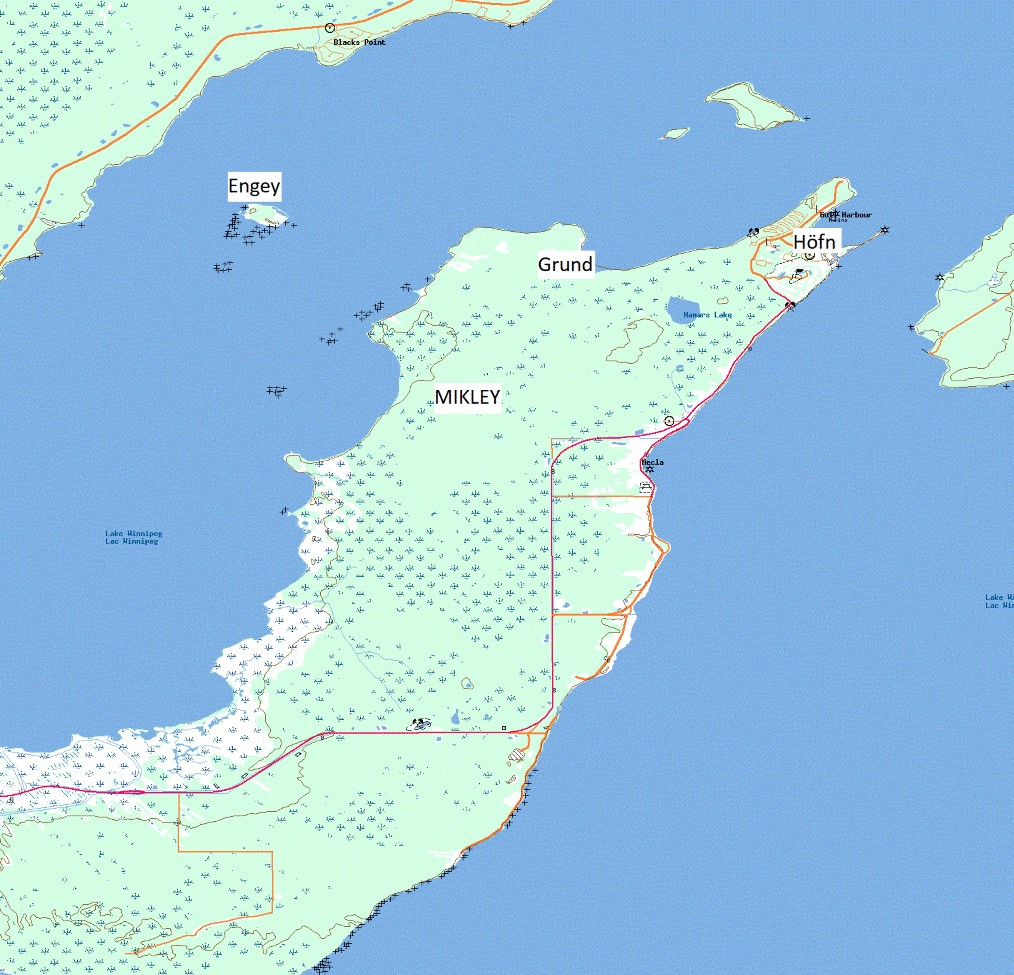In his work Frá Austri til Vestur (From East to West), published in Winnipeg in 1921, Þorleifur Jóakimsson writes the following about the settlement years of Jóhann and his family in Mikley:
Fire at Mikley: “When Jóhann came west for the second time in 1876, he went to New Iceland and to Mikley, and came to land in the southeast of the island on a sandy shore; he saw a flat area there and therefore named the place Borðeyri. The town that was built there was named after the sandbank. Just north of Borðeyri, Jóhann took land and called it Barkarstaðir, he gave the land that name because he covered his house with bark from birch trees, so that it would not leak. Here, about half of the house floor can still be seen, although it is old, and there is a deep hole in the middle of it, where the cellar used to be. (Þorleifur has been around there in the second decade of the 20th century: Inscot JÞ) The next spring, 1877, Jóhann moved from Barkarstaðir to the north of the island, to Gull Harbor, took land there and named it Höfn. There his house burned down at night in the dead of winter, but because Jóhann was a quick-witted man, he was able to save all the people and most of the household items. He had to break a window in the attic when he woke up to the fire, and threw the bedclothes out into the snow, with his wife and children on top of them. When it was over, the roof was all ablaze. Then he got other things out of the house below, while the ceiling was burning, and some potatoes from the cellar. He escaped just before the building collapsed. He sent his eldest son, Jón Elías, then about 9 years old, to the next farm to get help. The boy ran, scantily clad, as fast as  he could, probably didn’t notice much though the winter night frost on Mikley almost harmed him. The people on the farm, to whom he was sent, put him into a warm bed. ”
he could, probably didn’t notice much though the winter night frost on Mikley almost harmed him. The people on the farm, to whom he was sent, put him into a warm bed. ”
Further migrations: “Now Jón moved further north to the island, took land for himself for the third time and named it Grund; he lived there until after a three-year stay in Mikley in 1879, he moved to Engey, which is a small island northwest of Mikley. He made a raft out of logs and transported the people and what little he had over to the new island. But he was not there for long. After a year’s stay there, the lake flooded the island, so he had to flee from there. He then went south to the Víðirnes settlement and stayed at Steinstaðir and Hólm until the water dropped at Engey. Jóhann then went back there and lived handsomely, set up a windmill and ground his corn in it. With a steam engine, he sawed slab wood and firewood, and used it for various other purposes. He piped water into the barn so that it flowed constantly to the animals, but outside at a well it was seen when enough water had been supplied. Later, Jóhann’s older son, Jón Elías, who is now a farmer in Grunnavatns-bygð (Shoal Lake settlement) stayed with the family in Engey, and started helping his father by going out to fish and then taking the fish to Winnipeg. In 1902, the lake flooded Engey and destroyed Jóhann’s meadows and fields. He then had to move from the island for the second time, moved to Grunnavatnsbyggð, took land and lived there until he died.”
When Jón Elías was old enough, he got a job with Icelanders who were fishing in northern Lake Winnipeg, but in those days, at the end of the 19th century, you could fish on the lake during the summer. Below is a letter that Jóhann sent to his son from Engey with a fisherman who was on his way north to where Jón Elías was fishing.
Engey, 25 August 1888. My beloved Nonni! – May God give you all the moments of happiness and blessing. I thank you for two letters, which I received last Sunday evening, and with them came a letter, probably to Jói (Jóhann’s brother Jón), and a bag with line. But I do not know when the second letter to me was written, because it is not dated. – There is no news to write to you, everything is uneventful here and we are all feeling healthy by God’s grace. But your mother has been without coffee for quite some time and finds it disagreeable. We are now finishing the haying on the islet and are thinking of going south to where I hayed last summer, after the weekend. There has been little grass anywhere on dry land this summer, and haymaking is late here. There was a man traveling here, who was trying to get sawn timber, and he thought he might set down a mill on Black’s point; but whether it will be anything is uncertain. I intend to go to Winnipeg when I have finished haying, although I have nothing to take with me, for I am now poor of most things. I am going to ask you to write to me, the very first thing you can, and let me know about how many dollars I can expect to get from you, because you now know what time you will have, namely the closed season, and then you can expect what money you will have in total; but I really need to know how much you want me to have, before I go back there, because I will try to get a bit of a loan on top of that, but it probably won’t be possible, so maybe I can go back up there on my boat, when you come. Just don’t hesitate to write to me right away and come to Grund. There will be no time for you to think about longer work than to the close of the season, because it takes a lot of time to prepare the house and other things for the winter. I’m going to ask you to get me quite a lot of line, if you can get it at a good price, and like 200 oil flam.
Your mother and all the people kindly ask to greet you, and I send you my best regards and ask God to take care of you in life and in death. That’s what your father says.
J. Straumfjörð
P.S. – Remember to get a lot of laces, because it is said that you can get them for free. I will write to you and leave a letter for you in Grund, when you come from the north. You need money for your work but less products. The same.
Jón Elías moved in 1890 and went south to Winnipeg. There he got a job as a fireman for the city and was the first Icelander to work as that. He was there when his father wrote him a letter in late 1891:
Engey, 28 November 1891
My dear Nonni. May God give you all the moments of happiness and blessing in Jesus name. I sincerely thank you for the letter with Stjáni, as well as all the good things shown to me. Stjáni arrived on the evening of the 19th that month and then your brother Jói, and Fúsi and Jón at Víðimýri were to travel north. But the next day the weather was bad, so they didn’t leave until the 21st. Ice has become thick and hard frost this morning, 47 degrees. I have not yet heard anything about the fishing from the north. Jón at Víðimýri came home on Monday, he was sick, so he had to go home, but then no whitefish nets had been laid, but there is some fishing on the small promontory. Stjáni went north with Jói, because there weren’t many nets to make and it was useful, because my double-wide nets, which you had in the east last year, are rotten, so they are useless, and I can’t make any use of them.
I take care of the animals, except for what Ásta helps with, because Rænka is lying down, has been sick for almost a week, but is now better. If you come before Christmas, it’s essential that you get a hard-working man for you in the meantime. It would be good if you could get one or two good dogs and bring them along, if you could get them for little or nothing. I don’t remember if I asked you to help me with two dozen glasses with stoppers in the last letter I wrote or not, but I need them. We have the numbers on the girls’ shoes, it can be 5, but it would be best to mention it when you buy them, so that you get a replacement if they don’t fit. – I ask you to send my and our greetings to Jói and Nonni and Þóra and tell Jói that I will write to him soon, but I won’t be able to make it with this trip. Your mother and siblings kindly ask to greet you, and in conclusion, I bid you my best regards and ask God to take care of you. That’s what your father says.
J. Straumfjörð.
English version by Thor group.
